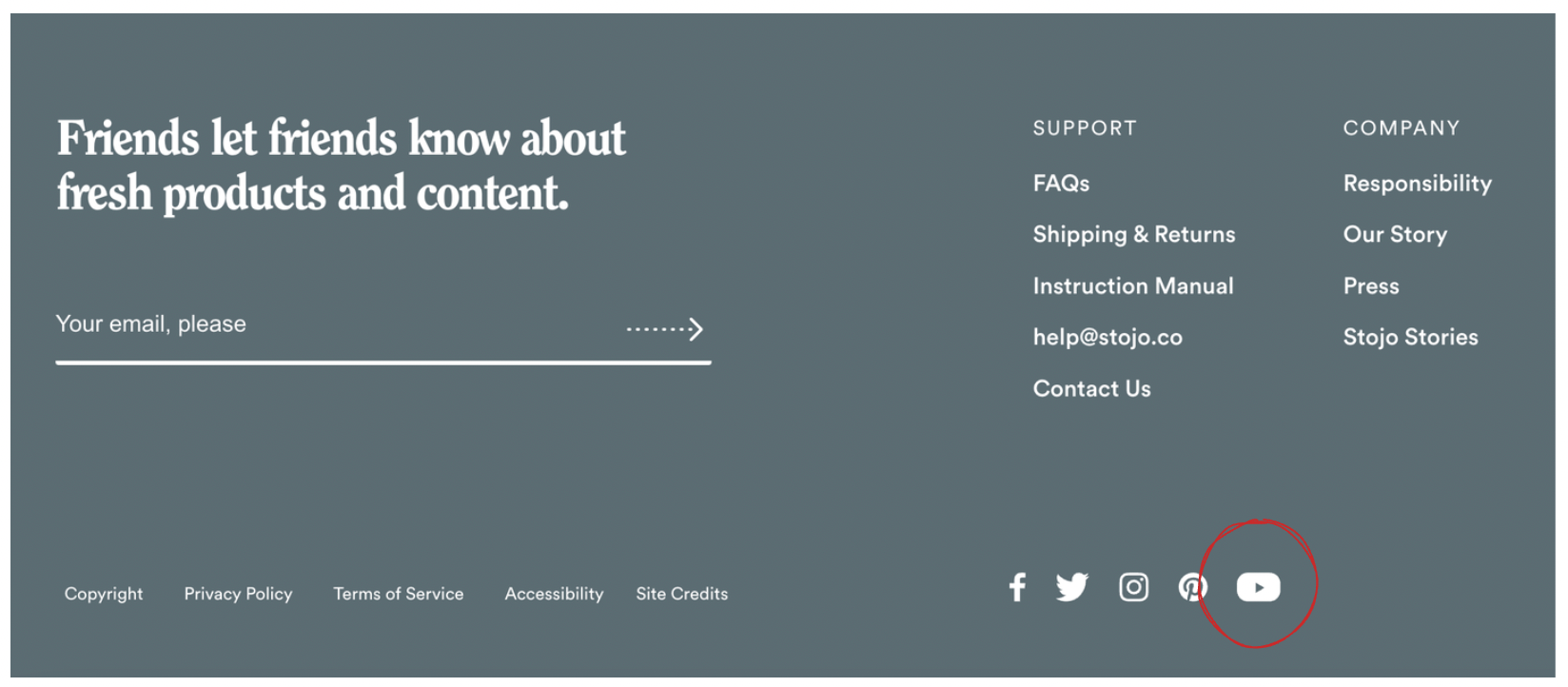Every day, YouTube users watch over a billion (yes, with a b) hours of YouTube videos, and yet only 9% of small businesses have bothered to start their own channel. As YouTube usage continues to soar, it becomes mission critical for businesses without a YouTube presence to jump in.
Learn how to start a YouTube channel for your business, creating and sharing compelling videos to engage current customers and attract new ones. We’ll also cover the most effective strategies for building a successful YouTube channel.
Table of Contents
- The benefits of having a YouTube channel
- Creating your YouTube channel
- Planning your YouTube content
- Shooting and editing videos
- Growing your YouTube channel
- Advanced YouTube tips
- Start your own YouTube channel
- How to start a YouTube channel FAQ
The benefits of having a YouTube channel
Starting a YouTube channel will give you an edge over your competitors, but there are plenty of other benefits too.
- Create a new traffic stream. YouTube is the third-largest search engine, which makes it a great place to reach people who are looking for visual content.
- Increase brand awareness. Video marketing increases brand awareness by 54% and generates 66% more qualified leads a year.
- Make your content work harder for you. YouTube videos keep driving traffic over time. Once you’ve uploaded a video, it can perform well for months and years with very little input.
- Build stronger connections. Sixty-four percent of consumers want to connect with the brands they buy from. Having a presence on YouTube helps forge deeper relationships with potential customers.
- Generate trust and loyalty: Video lets you show your audience what your brand is all about rather than just telling them. This proof leads to added trust and ongoing loyalty.
Creating your YouTube channel
Ready to get started? Here’s how to set up your YouTube channel.
How to create a YouTube channel in 4 steps
Create a YouTube channel for your ecommerce business by logging into the Google account you want to use to manage the channel.
TIP: Using a brand account instead of a personal channel comes with more benefits later down the line—like additional managers who can each have their own login password.
1. Visit YouTube while you’re logged in to the Google account you want to use to manage your account and head to the YouTube channel switcher.

2. You should see your personal account, any brand accounts you currently manage, and the option to create a new channel.

3. When you click on “Create a new channel,” you’ll be taken to a screen to create a new brand account. Choose a channel name for your new account and click “Create.” Here you can also upload a profile picture, such as your brand’s logo.
Congratulations! You’re now the proud owner of a YouTube page for your business.
Set up your profile and brand your channel
Now that you know how to create a YouTube channel for your business, get it looking its absolute best.
Here are a few easy steps you can take to give your channel a more professional look and make sure your customers know how to find you online.
Choose your channel icon
Your channel icon will initially be linked to your business account’s profile photo. YouTube will direct you to update your account to change it.

Your picture should be a JPG, BMP, PNG, or non-animated GIF, saved at 800 pixels x 800 pixels. Make sure it displays well at smaller sizes and in both a square and a circle crop for the multiple places YouTube will use your channel icon.
Create your channel art
Adding channel art is a great way to show off your brand’s personality and create a visually engaging YouTube profile. Your channel art should be under four megabytes and at least 2048 pixels x 1152 pixels, although YouTube recommends going with 2560 pixels x 1440 pixels for best results on all devices.

YouTube will give you a preview of each image to show you how it will be displayed on multiple devices. You can also edit or crop your image.
Fill out your profile

To unlock all of the customization options for your channel, you’ll need to click the gear icon in the section beneath your channel art.

A pop-up titled “Channel settings” will then appear. Look for the “Customize the layout of your channel” option and enable it. Click Save. You’ll now have a wider range of options sorted into five tabs: Home, Videos, Playlists, Channels, and About.
Head over to the About tab to edit your store’s details.

Under “Description,” give a brief outline of your store, products, and mission. Keep any core keywords for your store in mind and make sure to use them in your channel description to help people find you when they search YouTube. This will also help the YouTube algorithm understand what your channel is about.

Most of your links will default to the favicon (the small image that shows up at the top of your browser), but the first link in the lineup will also show the link title, so make the most of those 30 characters, as 100% Pure has done with its Shop Now call to action.

TIP: Verify your phone number so you can create videos longer than 15 minutes, livestream, and upload custom thumbnails. Click your profile picture and go to the YouTube Studio. Select Settings in the navigation bar, click the Channel tab, and go to Feature Eligibility. You’ll see the option to verify your phone number under the intermediate features.
Planning your YouTube content
Once your channel is set up, the fun can begin. It’s time to start planning your videos and creating content that attracts and converts your ideal customer.
1. Find your YouTube niche
Your niche is essentially what you’ll become known for on YouTube. For example, if you run a beauty brand, you’ll create videos within that niche—maybe you’ll share some makeup tutorials or answer beauty Q&As.
For best results, go deep with your niche and choose a niche within a niche. Instead of settling on “beauty” in general, could you niche further into sustainable cosmetics or curly hair care?
2. Identify your target audience
Who do you want to reach on YouTube? Your target audience should be those most likely to resonate with your content and buy your products. It’s much easier to come up with content ideas, make videos, and promote your brand when you know exactly who you’re talking to.
When identifying your target audience, consider:
- Demographic information, like age, location, gender, income, and educational achievement levels
- Psychographic information, like interests, behavior, challenges, and dreams
3. Create a unique value proposition
Your unique value proposition should bring together your niche and your target audience in a way that makes your brand memorable. It’s essentially the reason why people should watch your channel and what they’ll take away from your videos.
For example, your unique value proposition might be helping women with curly hair tame their locks through easy-to-follow tutorials. Or it might be spotlighting the craftspeople behind the products you make to raise awareness of small communities and traditional manufacturing techniques.
4. Find and analyze your competitors
Who are you up against? There’s nothing wrong with a bit of healthy competition, but having total visibility of what kind of content is already out there will help you map your own strategy. More than that, understanding what videos your competitors are creating will help you find your own place in the market.
Run a simple YouTube search using relevant industry keywords to find channels that:
- Share the same audiences as you
- Create content similar to yours
- Have a similar niche or unique value proposition
5. Build a list of video ideas
Now it’s time to start compiling a list of potential video ideas. Start big—you can hone it down later. Here are some tactics you can use to spark ideas:
- Check customer support tickets for FAQs.
- Get inspiration from competitor channels.
- Stay on top of news in your niche.
- Check out the trending topics in your niche.
Consider what types of video you’ll create. Will you post educational videos that show viewers how to do something? Will you tell brand stories using beautiful videography and behind-the-scenes footage? Or will you share entertaining videos aimed at making viewers laugh?
Vat19, an ecommerce gift shop that specializes in offbeat products, has built an impressive online empire with its engaging, highly targeted content. Its YouTube strategy focuses on building absurdist comedy sketches around its wide selection of novelty gifts to introduce new products to its audience. It’s currently sitting at nearly nine million YouTube subscribers, which means this approach is definitely paying off.
6. Run keyword research
Ultimately, YouTube is a search engine that uses keywords to determine whether a video will be useful to a searcher. Use a keyword tool like Ahrefs, SEMRush, or Moz to find popular keywords in your niche. When you know what search terms your target audience are using, you can incorporate them into your videos and content strategy to make sure you’re showing up in the right searches.
Shooting and editing videos
The good news is, you don’t need to be a pro videographer to make great YouTube videos. In fact, anyone with a smartphone can shoot high-quality footage—with a few extra tweaks on an editing app, you’ll barely notice the difference.
Once you’re ready to start shooting, here’s what to do.
1. Choose the right equipment
In short, starting a YouTube channel is relatively cheap—you just need a smartphone and some time to start creating. But if you feel limited by the quality of your phone and what you can do with it, consider investing in some videography equipment.
Here’s a list of items you might need to get started:
- DSLR video camera or a smartphone
- External microphone
- Lighting equipment
- Video editing app or software
- Somewhere to store your video files
- A tripod or a portable phone holder
2. Shoot your videos
When it comes to shooting your videos, think about how you’ll frame the content, any scripts you might need, and where you’re going to film. For example, if you film indoors, you might need to consider the lighting more than if you were shooting outdoors.
Before you set up your camera, consider:
- What you’re going to say in the video (if anything)
- The structure of your video (creating a storyboard helps)
- Whether you need any additional people to feature in the video
- The main message you’re delivering
- Where you’re going to film the footage (Do you need total silence? Will the weather affect your plans?)
- How you’ll organize the footage you capture ready for editing
3. Post your first video
This is where it all starts to come together. Your video is as good as it can be and you’re ready for your audience to devour your useful tips.
Here’s how to upload a YouTube video:
- Click the camera icon next to your profile picture.
- Select Upload Video”
- Select the files you want to upload.
- Give your video a title.
- Add a thumbnail.
- Write a description of your video (include keywords and a call to action).
- Choose the relevant categories your video falls under.
- Once it has rendered, click Finish.
- Voila! Your video is uploaded and ready to view.
Growing your YouTube channel
1. Get your first 1,000 subscribers
Your first 1,000 subscribers are the hardest to get. You have to prove that your channel is worth watching and that you have content that’s relevant to their needs.
Here are some tips for getting your first 1,000 YouTube subscribers:
- Break it down into smaller steps and aim to get 100 new subscribers a month.
- Make it easy for viewers to subscribe by adding a YouTube Subscribe Button to your videos.
- Add a YouTube sSubscribe link in your video descriptions.
- Encourage your newsletter subscribers and social media followers to subscribe to your YouTube channel.
- Identify which videos get the most views and create more of the same.
2. Build a community
Community is a powerful tool on YouTube. The more people you have vouching for you and your channel, the easier it is to reach more viewers. Start by optimizing your videos for visibility with relevant keywords and engaging with similar existing channels. You can also poll your audience about what content they want to see, run contests and giveaways to create a buzz, and film series that ensure viewers come back for more.
3. Consistency is key
You don’t need to publish a new video every day—that’s impossible with everything else you have to do. Instead, create a schedule that’s realistic and comfortable. For example, you might decide to upload two videos a month, such as one tutorial and one behind-the-scenes sneak peek.
Once you’ve created your schedule, stick to it. Viewers will start to expect and anticipate your next upload, which creates a sense of excitement around your channel.

4. Cross-promote your channel on other platforms
If you have a decent following on other platforms, like Twitter, Facebook, Instagram, or your newsletter, promote your YouTube channel there. Invite existing followers to join you on Facebook, either by sharing a link in your social media bio or including a call-out at the bottom of every newsletter. Don’t forget to add a link to your website, too.

5. Collaborate with other creators
Take advantage of YouTube’s extensive influencer and creator communities. Identify channels that have a similar audience to yours and reach out to collaborate. There are plenty of ways you can work with other YouTubers, such as:
- Creating a joint video using clips from both sides
- Running a takeover on another creator’s channel where you can introduce your brand to their audience
- Sending a product to your chosen creator for them to film an unboxing video or a review

6. Lean on useful tools
YouTube tools optimize your videos, helping you create better content quicker to get your videos in front of the right people fast.
Here are some must-have YouTube tools we recommend using:
- Video editor: Use editing software to cut clips together and enhance the quality of your footage. iMovie and Windows Video Editor are free.
- Keyword research tool: Find relevant keywords to create videos about with tools like Google Keyword Planner (free), SEMRush, and Ahrefs.
- Performance tools: Track the performance of your YouTube channel and test out different title and description variations with TubeBuddy or Social Blade.
- YouTube Studio: Manage your channel on the go with YouTube Studio, which lets you monitor your performance and organize videos from your mobile.
Advanced YouTube tips: Pro tips to make your YouTube channel stand out
- Monetize your channel with ads.
- Set up Shopping on YouTube to promote your products.
- Add a watermark to your videos to increase brand awareness.
- Enable an automatic subscription prompt on your videos.
- Link info cards to relevant content on your website.
- Incorporate relevant end screens to increase viewer retention rates.
- Create custom thumbnails that reflect your unique branding.
Start your own YouTube channel
Creating a YouTube channel will give you a competitive edge and build trust and awareness around your brand. Take the time to figure out who you want to target and what your unique value proposition will be. Then, come up with video ideas that will resonate with those people.
Once your channel is up and running, you can focus on getting more views and subscribers through monetization methods, creator collaborations, and cross-promoting your channel on other platforms.
How to start a YouTube channel FAQ
Is it worth it to start a YouTube channel?
Starting a YouTube channel can be a rewarding experience, but whether or not it is worth it largely depends on your goals and expectations. Here are some factors to consider:
- Passion. If you are passionate about a particular topic or niche, starting a YouTube channel can be a great way to share your knowledge and connect with others who share your interests.
- Time. Creating quality content for your YouTube channel takes time and effort. If you are unable or unwilling to commit the necessary time, you may struggle to gain traction and grow your audience.
- Competition. YouTube is a crowded platform with millions of creators vying for attention. While this can be daunting, it also means there is almost certainly an audience for any topic or niche you are interested in.
- Revenue. While it is possible to make money from YouTube ads and sponsorships, it is unlikely to be a significant source of income unless you have a large and engaged audience.
How do I start a YouTube channel and get paid?
- Create your channel and set up your profile.
- Find your YouTube niche.
- Identify your target audience.
- Find and analyze your competitors.
- Choose the right equipment.
- Get your first 1,000 subscribers.
- Monetize through YouTube ads.
- Add Shopping on YouTube to your channel.
How much will it cost to start a YouTube channel?
Starting a YouTube channel doesn’t have to cost anything. All you need is a Google account, a smartphone, and free editing software. When your channel starts growing, you might want to invest in some more powerful editing tools, as well as keyword research and analytics tools.
https://www.shopify.com/blog/start-a-youtube-channel-for-your-business

